Edition 72: October 2023
-
Helpful contacts
Employee Assistance Program: 1800 099 444
Nurse & Midwife Support: 1800 667 877
Nurse & Midwife Health Program: 03 9415 7551 or 1800 888 236
-
Upcoming dates
October 2023
6 Research week oral presentation abstracts close
8 BankVic Reseach Grant and Plenary Health Innovation Grant applications close
9 Research Week E-Poster submissions close9 AICED Program Roll Out
13 Mavis Mitchell Scholarship Close
16-20 Research Week
19 Nursing & Midwifery Research Week session
30 IHI International Forum on Quality & Safety in HealthcareCheck out Events for more details.
-
Nursing & Midwifery Executive
Adjunct Professor Shane Crowe
Executive Director of Nursing & Midwifery
Phone: 8345 1463
Email: shane.crowe@wh.org.auProfessor Bodil Rasmussen
Chair of Nursing, Deakin University/Western Health
Phone: 8395 8163
Email: bodil.rasmussen@wh.org.auDoug Mill
Director of Nursing & Midwifery
Division: Chronic & Complex Care
Phone: 0400 807 938
Email: douglas.mill@wh.orh.auHelen Sinnott
Director of Nursing & Midwifery, Sunshine
Phone: 0435 962 716
Email: helen.sinnott@wh.org.auAdjunct Associate Professor Jo Mapes
Director of Nursing & Midwifery, Footscray
Division: Perioperative and Critical Care
Phone: 0423 302 337
Email: joanne.mapes@wh.org.auKylee Ross
Acting Director of Nursing & Midwifery Informatics (CNMIO)
Phone: 0409 555 384
Email: kylee.ross@wh.org.auLena Pejcinovski
Director of Nursing, DPFC
Division: Custodial Health
Phone: 0422 818 187
Email: lena.pejcinovski@wh.org.auProfessor Linda Sweet
Chair of Midwifery, Deakin University/Western Health
Phone: 8395 1178
Email: linda.sweet@wh.org.auLisa Gatzonis
Director of Nursing & Midwifery Workforce
Phone: 0466 943 769
Email: lisa.gatzonis@wh.org.auMonique Sammut
Director of Nursing & Midwifery, Sunbury
Divisions: WPHU and Clinical Support & Specialist Clinics
Phone: 0412 769 423
Email: monique.sammut@wh.org.auNicole Davies
Director of Nursing & Midwifery, Williamstown
Division: Emergency, Medicine & Access
Phone: 0435 656 190
Email: nicole.davies@wh.org.auRobyn Peel
Director of Education & Learning
Phone: 0468 608 141
Email: robyn.peel@wh.org.auRohan Vaughan
Director of Nursing & Midwifery, Melton
Division: Drug Health
Phone: 0434 365 769
Email: rohan.vaughan@wh.org.auRyan Dube
Director of Nursing
Senior Mental Health Clinical Lead
Division: Mental Health & Wellbeing
Phone: 0420 228 035
Email: ryan.dube@wh.org.auAdjunct Professor Tanya Farrell
Director of Maternity Services
Division: Women’s & Children’s
Phone: 0468 830 755
Email: tanya.farrell@wh.org.auVal Dibella
Acting Director of Nursing & Midwifery (Inspiring Innovation)
Phone: 0466 489 687
Email: val.dibella@wh.org.auWendy Giddings
Director of Nursing & Midwifery, Bacchus Marsh
Divisions: Aged, Cancer & Continuing Care and Bacchus Marsh & Melton
Phone: 0458 603 897
Email: wendy.giddings@wh.org.au
From Shane
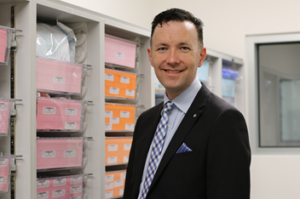
October is the month we celebrate all things research, which culminates in Research Week which is being held between 16-20 October. Research is one of our 5 domains that make up our professional practice framework, and irrespective of the role that you undertake, research is an important part of your practice. It drives clinical decision-making, advances in nursing and midwifery practice, the generation of knowledge and builds critical thinking, innovation and questioning of clinical practices. Our nurses and midwives generate knowledge through leading, collaborating and participating in research projects.
Did you know that on average between 5 to 10 research articles authored by a Western Health nurse or midwife are formally published in peer-reviewed journals each month? I am incredibly proud of our Nursing & Midwifery research program, which continues to go from strength to strength. I encourage you to come along to the Nursing & Midwifery Research Week session on Thursday 19 October at 2pm to support your colleagues that are undertaking nurse-led or midwife-led research.
I am delighted to advise that despite increasing our graduate numbers for 2024 to support our growth, Western Health has done exceptionally well in the graduate match process for both nursing and midwifery. This means that the graduates that we have picked, have also picked us – which is an excellent sign that we continue to build upon our reputation as being an employer of choice for nurses and midwives. You have all had a role in building this reputation, through the actions that you do everyday to support our positive workplace culture, the kindness and support that you show to your colleagues and students on placement, and your commitment to delivering Best Care. This is great news for the strength of the nursing and midwifery workforce at Western Health into the future.
Please join me in welcoming the 23 new nurses that have commenced our Transition to Acute Care program this week. With your support, these experienced nurses will be confident and highly capable new members of our Western Health team in no time.
You will notice that there is a lot of work occurring at the moment, with a focus on how we document our plans of care and the care provided in the EMR and handover this safely and effectively to our colleagues. This work is designed to enhance the nursing and midwifery voice within the consumer’s record, and make it easier, more intuitive and have clearer guidance for our nurses and midwives. A number of connected pieces of work are occurring this month to support this, including:
- the AICED program – which is the process covering Assessment, Identify patient risks, diagnosis and goals, Care planning and delivery, Evaluate Care and Documentation and handover.
- the Comprehensive Care Interdisciplinary Plan of Care (IPoCs) has been updated to make it more intuitive , and to become the single nursing care plan for every adult patient admitted to a ward currently using the EMR.
- Handover. We are focusing on enhancing the use of ISBAR and the need to ensure that every patient undergoes correct identification and procedure matching to receive the intended care at any point during their care. This includes on registration; when care, medication, therapy and other services are provided, undertaking a patient assessment, or transfer or discharge documentation is generated. Don’t forget 3 point ID three EEE’s: Every patient, Every procedure, Every time.
Finally, at the end of the year approaches, this means that our short-notice accreditation survey is now imminent. We have a great team here at Western Health and every day we deliver Best Care to our community. We have got this! It will be a chance for you to talk with pride about the important work that you do everyday with the surveyors. If you are uncertain about anything, there are lots of resources available – please check the Live Best Care site or talk to your manager.
Shane Crowe
Executive Director, Nursing & Midwifery
Research Week - Nursing & Midwifery
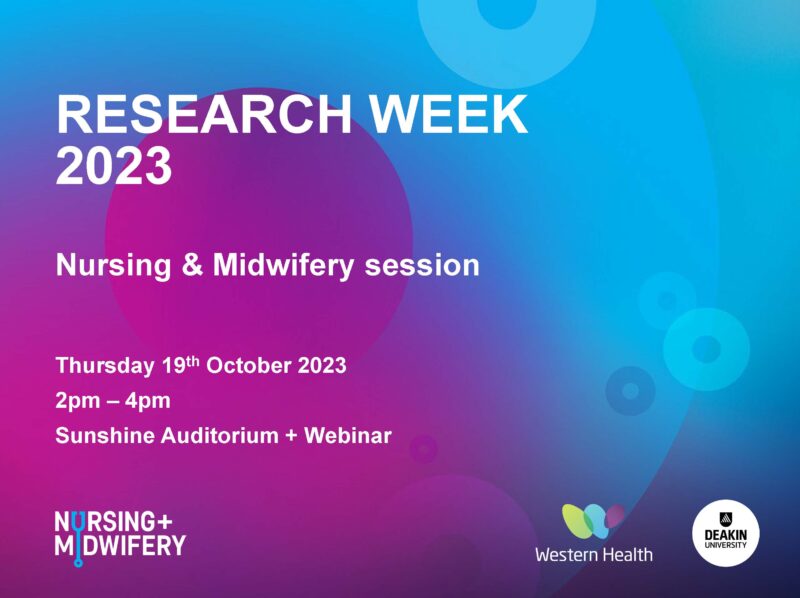
Research Week is held each October at Western Health, to celebrate the great research undertaken at the health service and to learn more about our future initiatives and innovations.
As part of this important week Nursing & Midwifery holds a session which focuses on celebrating the work and projects undertaken by nurse and midwife researchers. During this week we also bestow Research Grants and the Mavis Mitchell Scholarship to support nursing and midwifery led research at Western Health.
In 2023 this session is being held on Thursday 19 October between 2-4pm in the Sunshine Auditorium and via Webinar
This years keynote speakers are:
- Associate Professor Deb Kerr: What to teach and how to teach nurses about communication
- Adjunct Professor Tanya Farrell: Why midwives matter and how they can make a difference
Abstracts:
A reminder that nurses and midwives can submit both oral and poster presentations. As an incentive, this year we are delighted to announce there will be a $250 prize for the best oral presentation and $250 for the best poster presentation.
- Oral presentation: There will be four to six 10 to 15-minute oral presentations on the day. The best presentation prize will be decided by visiting academics and announced on the day.
- E-Poster: There will be an unlimited number of e-poster presentations. Posters will be required as a single PowerPoint slide made into a PDF file and will be made available on the Nursing and Midwifery microsite 1 week prior to Research Week. E-Posters can be a new presentation or something you have created during the pandemic and have not yet been able to display at Western Health.
Please click here for abstract guidelines, selection criteria and submission details.
Applications must be submitted by email to WHDeakinPartnership@wh.org.au. Applications close 6 October 2023 and the successful applicants will be notified by the 9 October 2023. E-Posters are to be provided as PDF file to be uploaded by 9 October 2023 for viewing and voting.
Peer Support Program Launched

During the month of September, Western Health launched a new health and wellbeing initiative for all staff and volunteers – the Peer Support Program.
Peer Supporters are trained employees who volunteer their time to provide informal and confidential support to all Western Health employees who may be experiencing challenges and are looking for someone to speak to, or who may need assistance navigating additional and more formal pathways for support.
The role of a Peer Supporter is to:
- listen to the employee’s experience, issues and concerns;
- work collaboratively with, and support colleagues to determine the best options for addressing their concerns;
- guide and encourage access to appropriate and professional services to ensure the right support is provided in a timely manner;
- provide confidential support.
With more than 30 fully trained Peer Supporters located across Western Health sites, staff are encouraged to familiarise themselves with the service offered and how to access it. A list of all Peer Supporters and their contact details is available on Westerly.
Western Health sees this as an important initiative in further supporting all our employees; ensuring employee psychosocial safety remains a priority and Western Health is well placed to provide the best support to our people who provide best care.
Changes to the Comprehensive Care IPOC
![]()
The Comprehensive Care IPOC has now become the single nursing care plan for every adult patient admitted to a ward currently using the EMR. This workflow does not apply to maternity or ICU patients.
By moving away from initiating multiple IPOCs, to using only the Comprehensive Care IPOC for each patient, we anticipate a significant reduction in the duplication of nursing care tasks and overall documentation burden experienced by our nursing staff. Importantly, this new workflow supports the completion of improved bedside patient assessments, patient goal setting and care planning that reflects every patient’s individual care needs and addresses identified risk factors. Please note that the Post Fall IPOC is still required post an inpatient fall.
To summarise the new Comprehensive Care IPOC workflow, every shift the bedside nurse will be required ensure each patient has a Comprehensive Care IPOC that reflects all of the patients care needs. The nurse will deliver patient care as outlined in the Comprehensive Care IPOC, and subsequently document progress towards goals using the Document in Plan function. The Comprehensive Care IPOC must be evaluated every shift by the bedside nurse, ensuring relevant interventions are added, modified or discontinued as required. The Comprehensive Care IPOC should also be included in bedside handover. Linking our patients identified risks to nursing interventions in their care plan, is a fundamental element of providing safe care to our patients.
Nursing staff are encouraged to document a summary of care provided and include any variances to the patients care plan using the Nursing Shift Note function in the Nurse Manage page in Nurse View. This Nursing Shift Note will be saved to Continuous Notes and ensure important information is easily accessible and communicated to our medical and allied health colleagues. There are improvements planned for the Nursing Shift Note function, as our clever EMR team finalise building a new version that will reduce duplication and improve communication of patient care amongst the MDT, so stay tuned! Please make time to watch the 3 minute Comprehensive Care Training Video Initiating, Documenting and Reviewing a Comprehensive Care IPOC | (wh.org.au) and familiarise yourself with the Comprehensive care IPOC QRG Comprehensive-Care-Admission-Assessments-Adult-Risk-Assessments-Creating-a-Comprehensive-Care-IPOC.pdf (wh.org.au). There are Comp Care IPOC flip cards also available that step out the process of creating and managing a Comprehensive care IPOC so please reach out to your education team or NUM if you would like one.
Over the next 4-6 weeks, our ward NUMs will be completing weekly audits to monitor local adoption and compliance with the new Comprehensive Care IPOC workflow. Please continue submitting your completed audits every Thursday to your respective Operations Managers and Sam Angiolella or Rebecca Woltsche. If you would like additional information, please contact either Rebecca Woltsche or Sam Angiolella.
Call to engage in National Nursing Workforce Strategy workshops
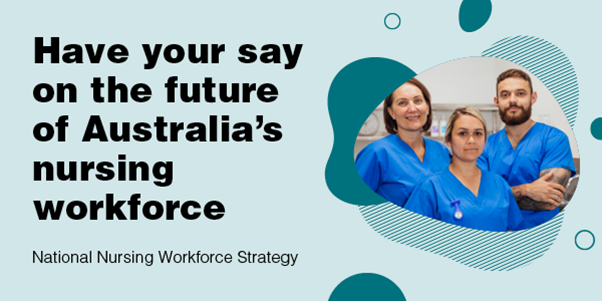
There has been a call to engage in face-to-face workshops on the development of the National Nursing Workforce Strategy.
The Commonwealth and Victoria, in collaboration with all states and territories, are developing a National Nursing Workforce Strategy to address workforce challenges and support the nursing profession to deliver person-centred, evidence-based, compassionate care to Australian communities across all sectors now and into the future.
Consultation is now open to capture views on nursing workforce issues and opportunities for improvement. Face-to-face workshops are scheduled around Australia. The Melbourne session is schedules for 24 November, and there is a session in Bendigo scheduled for 22 November.
Sign up to attend a workshop at www.health.gov.au/nnwsconsultation.
Consultation activities will run from September until the end of November 2023. Future opportunities to have your say include targeted interviews, sector specific webinars, yarning circles, community conversations and an online survey.
All consultation activities will be available at www.health.gov.au/nnwsconsultation.
Please contact nursepolicy@health.gov.au if you have been unable to book into a session and we will do our best to offer an alternative.
Preterm Birth Collaboration with Safer Care Victoria
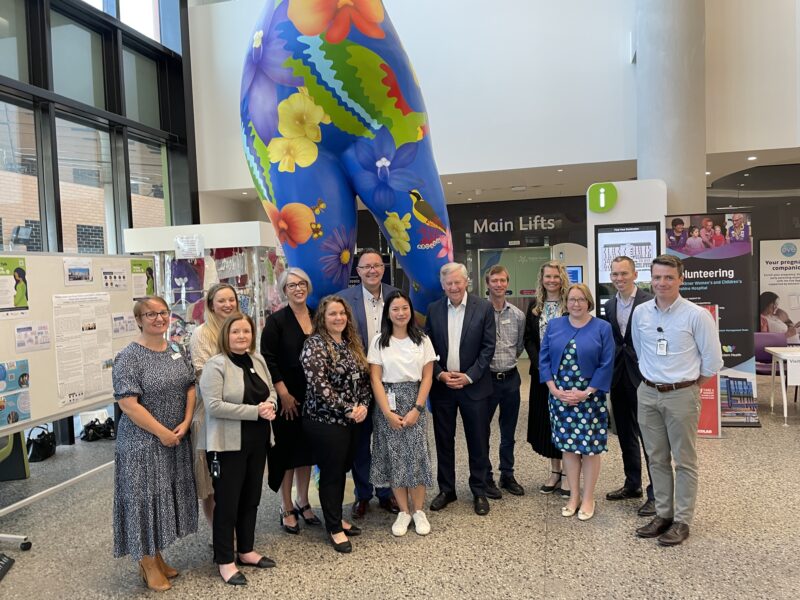
On Monday 2 October, Western Health hosted Professor John Newnham (Chair of the Australian Preterm Birth Prevention Alliance & Chair of the National Preterm Birth Prevention Collaborative), Professor Stefan Kane (Clinical Lead – Preterm Birth Prevention, Safer Care Victoria, Maternal Fetal Medicine Subspecialist Obstetrician) and Safer Care Victoria colleagues to share evidence around the prevalence and impact of preterm and early term births in Australia.
Western Health is an active member of the National Preterm Birth Prevention Collaborative, and the educational session that was held was an excellent opportunity for our team (pictured right) and a large audience in the auditorium to hear for these experts, about the work of the National Preterm Birth Prevention Collaborative, and strategies to reduce preterm and early term births.
Our fantastic Joan Kirner Preterm Birth Prevention Collaborative team were able to present our current state, achievements thus far during the collaborative and areas of focus for final 6 months of the collaborative.
Showcasing research, innovation and impact

The Office for Research in partnership with the Western Health Foundation are pleased to announce the release of an additional 2 prestigious grants: a $20,000 research grant sponsored by our corporate partner Bank Vic and a $10,000 Plenary Health Innovation Grant.
The BankVic grant can be used to develop a feasibility study or support completion of existing Western Health research initiatives in new models of care, health service delivery, innovation or quality improvement. Both new and currently underway projects are eligible to apply.
The Plenary Health Innovation grant can be used to develop a feasibility study, support completion of existing Western Health led research or to further develop these activities towards the next phase of development. Both new and currently underway projects are eligible to apply.
All application information and eligibility criteria are contained within the respective below Expression of Interest (EOI) documents.
Plenary Health Innovation Grant 2023
Application Process
- All EOIs must be submitted by Sunday October 8 11:59PM
- Each EOI must be emailed to whsgrants@wh.org.au with a Cc to bill.karanatsios@wh.org.au
- Please insert email subject: Name of Grant EOI: Applicant Name
- Late Submissions will not be accepted.
Successful applicants will be announced at Research Week Closing Event held 20 October 2023, 12.30pm.
For any further queries, contact either Bill Karanatsios or Harin Karunajeewa from the Office for Research
Mavis Mitchell Scholarship
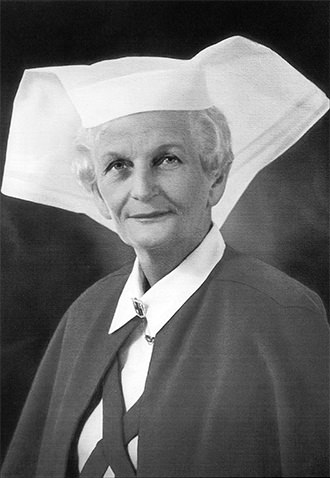
The Mavis Mitchell Memorial Scholarship is a $5,000 award or scholarship granted to Registered Nurses and/or Midwives, who are employed within Western Health. Applications will be accepted by individuals or a team.
The intent of the scholarship is to provide funding to enable and assist eligible Registered Nurses/Midwives to undertake a service improvement/quality project or research in any activity approved by the Selection Committee.
The project or research must be beneficial to our consumers, or to the community served by Western Health, in the opinion of the Selection Committee. This project or research can be by an individual or group.
Applications close on Friday 13 October 2023 and can be submitted to whs-ceadmin@wh.org.au.
For more information on the scholarship please click here. For Application & Guidelines click here.
Click here to view the past recipients of the Mavis Mitchell Scholarship.
Methicillin Sensitive Staphylococcus Aureus / Methicillin Resistant Staphylococcus Aureus: The Super-Villain
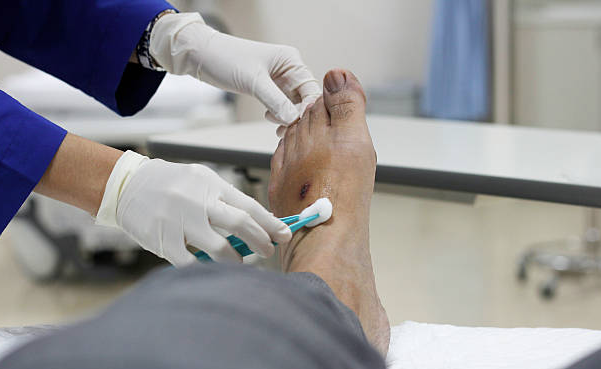
Staphylococcus aureus is the most frequently isolated bacterial pathogen in wounds. Staphylococcus aureus is an important cause of both acute and chronic wound infections. Many of our patients present to hospital with pre-existing wounds. Almost all wounds are colonized with a spectrum of microbes. However, only some of them are considered infected wounds. Western Health has seen several recent Staphylococcus aureus bacteraemia (SAB) that were wound related but not swabbed on admission and then deemed healthcare acquired because the blood stream infection was detected more than 48 hours after admission. If swabbed early in admission then these SABs would be deemed community acquired and not Western Health acquired.
Do your patients wound need swabbing within 48 hours of admission?
Part of our initial assessment of a wound is to determine whether a wound swab is required. A wound should only be swabbed if there are clinical signs of infection and the wound is deteriorating, increasing in size or failing to heal.
The classic clinical signs of infection in an acute wound include:
- New or increased pain
- Swelling
- Erythema
- Purulent exudate/discharge (or serous exudate with inflammation) There is often purulent discharge and, depending on the offending organism, may have a strong odour.
- Malodour or unpleasant smell
- Localised warmth around the site of the wound
Signs of spread of a localised wound infection include extension of erythema (and development of cellulitis), abscess formation, lymphangitis, crepitus in the soft tissues and breakdown or dehiscence (splitting open) of the wound.
If your initial nursing assessment includes any of the above your wound needs to be swabbed within 48 hrs of admission for a multitude of reasons
- A swab can shed light on the potential complications in wound care if there is a microorganism present such as Staphylococcus aureus
- For local wound evaluation, wound swabs can be valuable for surveillance of the flora colonising a wound
- Assists with the treatment plan
- Assists with optimal wound management and antibiotic usage based on the assess
Did you know that all intravenous lines need to be labelled?
![]()
The ‘National Standard for User-applied Labelling of Injectable Medicines, Fluids and Lines’ aims to reduce patient risk from injectable medications and highly recommends all intravenous (IV) IV lines are labelled when administering IV medications and IV fluids.
Western Health’s ABC Audit in November 2022 indicated inadequate (38%) IV line labelling compliance. The Medication Safety committee endorsed a nursing and midwifery quality improvement project in June 2023 to implement strategies to educate nurses and midwives to the requirement to all a label to all lines (irrespective of the time the therapies are being administered) and sustain the labelling practice.
During the June 2023 ABC Audit an overall increase of 19% compliance has occurred in the intervening 6-month period across clinical areas to a total of 57%. Continuous improvement is a focus to obtain 100% of IV lines labelling.
Ongoing Improvement Plan:
All intravenous lines are to be labelled with IntraVENOUS stickers

A revised Intravenous Therapy (IVT) Management procedure has been published on Prompt platform to support the increase in awareness and compliance.
A poster has been developed to guide IV line labelling in clinical wards and departments.
For more information, email leanne.nuske@wh.org.au. or discuss with your local nurse/midwife educator or pharmacist.
Stay safe in hospital: cannula care
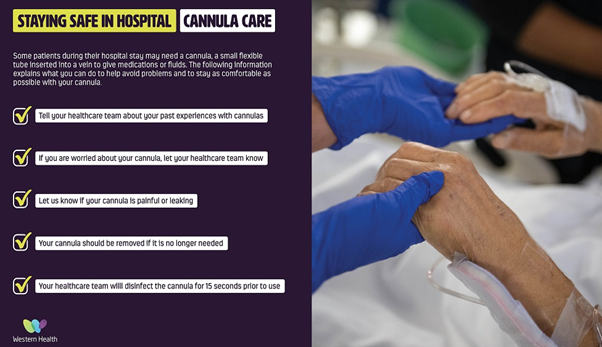
It is imperative we incorporate our patient’s voice in everything we do. Person-centred care is globally recognised as the gold standard approach to healthcare delivery. Partnering with patients in their own care has never been more important from an infection prevention perspective for their best health outcomes.
Peripheral Intravenous Catheter (PIVC) associated Staphylococcus aureus Bacteraemia (SAB) infections account for close to 40% of all hospital acquired SAB infections. 25% of hospitalised patients die post contracting a SAB infection. This is just one organism, as PIVC related infections from other organisms also has a significant impact on patient safety and patient outcomes. Data from Australia and internationally, overwhelmingly suggest that a large proportion of patients with a PIVC do not receive the recommended evidence-based care and that such infections are preventable.
In a show of commitment to reducing PIVC related SAB’s, Western Health’s SAB Taskforce has created a patient centred approach to PIVC care by providing health information in engaging and accessible formats like our cannula care consumer screen saver and poster. We encourage all areas to display the cannula care screen saver on TV screens at ward entrances to engage with our consumers to drive and sustain service improvement.
Revised COVID Testing Criteria, Isolation and Deisolation Algorithm
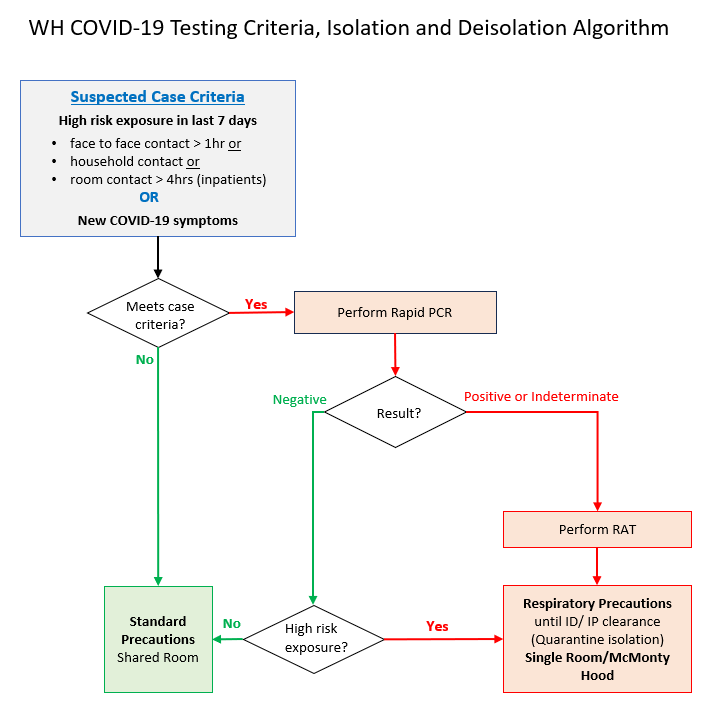
Western Health has continued to closely monitor the status of COVID in our facilities and across the community. Based on our experience and evidence, Western Health is now moving to a COVID Sustainability Admissions Pathway.
The updated COVID-19 Testing Criteria, Isolation and Deisolation Algorithm (pictured right) reflects our sustainability strategy.
Anyone who develops COVID symptoms on admission or as an inpatient or is a high exposure risk should have a Rapid PCR taken urgently.
Authorisation is no longer required for a Rapid PCR so there should be no delays to testing.
Routine surveillance testing for inpatients using Rapid Antigen Tests is no longer required.
We will continue to monitor the data and will formally advise all staff and volunteers of any change to our PCR/RAT testing in the future.
We continue to be committed to providing a safe environment for all of our staff, patients, volunteers and visitors and again thank you for your commitment and support.
Aboriginal Health After-hours Service
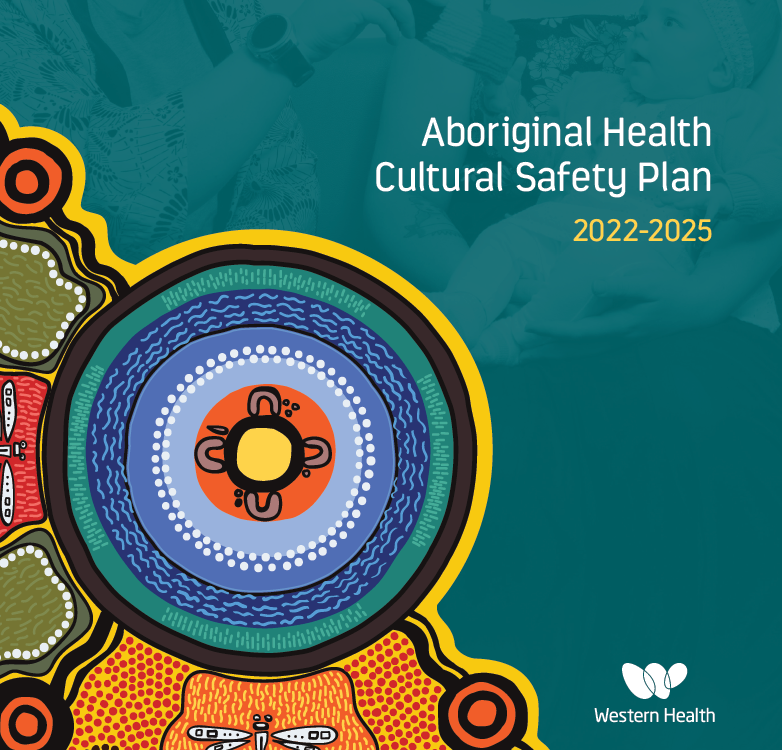
Effective from Monday the 25th of September 2023, Western Health will provide an Aboriginal Health after-hours service. The after-hours service is a key deliverable of our Aboriginal Health Cultural Safety Plan 2022-2025.
This service is accessible to all Western Health campuses and teams, and can be activated by the Nurse In Charge / Midwife In Charge by contacting Western Health switchboard.
The after-hours service will provide support to patients who identify as Aboriginal or Torres Strait Islander People who;
- discharge against medical advice;
- require cultural safe end of life care;
- are experiencing complicated cases that require extra support; and
- supporting staff during these situations.
The telephone support and recall service (where required) are available 5pm to 8am Monday to Thursday and weekend coverage commencing at 5pm on Friday and concluding 8am Monday.
Medication Safety Champion Program
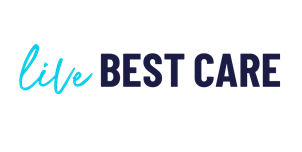
The Medication Safety ‘Fab 5’ have recently launched the Medication Safety Champion program. The program aims to promote optimal outcomes (Best Care) through enhanced medicines management.
The program will focus on prevention of adverse medication events by supporting nurses and midwives and empowering patients, to achieve best practice in medication management through the implementation of proven and sustainable strategies integrated across Western Health sites.
The Medication Safety Champion program aligns to the National Safety and Quality Health Service Standards (Medication Safety) and is overseen by the Western Health Medication Safety Committee.
Western Health Medication Safety Champions are nurses and midwives who have been appointed by their Unit Manager to increase awareness of medication safety in clinical areas, align clinical practice to the National Standard and support improvement activities.
If you would like more information about the program, please email MedicationSafetyChampionenquiries@wh.org.au
Learn how to AICED your patients?

The AICED program roll out will commence on October 9th. This program is to support the delivery and documentation of patient care. The initial roll out will be to adult inpatient areas and the program will be modified for different areas and eventually rolled out to the whole organisation. It will involve a WeLearn package, simulation, face to face sessions on the ward and bedside coaching. Learning will be individualised for your skill and knowledge level.
The program consists of the following:
A – Assessment A-E
- Basic Admission Assessment
- Initial Patient Assessment
I – Identify patient, risks, diagnosis and goals
- Adult Risk Assessment
- Initiate Comprehensive Care IPOC
C – Care Planning and Care Delivery
- Select goals, interventions and orders that reflect assessments
- Review suggested IPOCs and add relevant information to Comprehensive Care IPOC
- Reject suggested IPOCs
- Care delivered to align with IPOCs
E – Evaluate Care
- Document progress using document in plan
- Document variances in nursing shift note
- Review Comprehensive Care IPOC and make changes according to evaluation. Handover.
D – Documentation and Handover
- Have you completed?
- Basic admission assessment form
- Initial Patient Assessment
- Adult Risk Assessment
- Comprehensive Care IPOC
- Variances in shift note
- Handover using ISBAR
Have you AICED your patient today?
There will be a suite of educational resources. Each week there will be quizzes, crosswords or other activities with a prize each week. There will be small chocolates for completion of learning and a monthly pizza lunch for the best performing ward.
Bacchus Marsh Hospital and Melton Digital Health Transition Project

The Bacchus Marsh Melton Digital Health Transition Project is extending the Digital Health functionality currently used at Western Health’s Footscray, Sunshine, Williamstown and Sunbury sites to the Bacchus Marsh Hospital and Melton Health sites to aid the flow of healthcare information across the organisation and support seamless, safe and effective care.
Work on the Digital Health extension has been underway for quite some time and indeed the transition of numerous applications has already occurred over the first stage of the project.
We are now in an exciting phase where work is underway on the second stage of the project which will involve the transition of a number of clinical and administrative systems to BMM sites to align with the wider organisation.
To help nurses, midwives, and other staff prepare for this transition, information sessions will be held at Bacchus Marsh Hospital and the Melton Health Hub in October.
These information sessions will provide a project overview and timeline, with a focus on plans for training and support. Key project contacts will be in attendance and will look forward to answering queries. The same information will be presented at each site.
- Wednesday 18th October, 2 – 3pm, Melton Health Hub – Conference Rooms 1 & 2
- Thursday 19th October, 2 – 3pm, Bacchus Marsh Hospital – Conference Room
For more information on the Bacchus Marsh Melton Digital Health Transition Project, please visit the dedicated project page on the Digital Health information site.
Have your say in the National Workforce Survey for Child, Parent and Family Mental Health
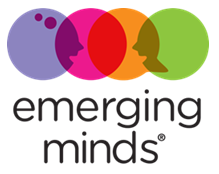
Emerging Minds is conducting the National Workforce Survey for Family, Parent and Child Mental Health following the success of the inaugural survey in 2020-21. The survey will inform strategies and policy to meet the needs of health, social and community services workers across Australia, and support improved outcomes for infants, children and families.
Health, social and community services workers are invited to complete the 2023 National Workforce Survey for Family, Parent and Child Mental Health.
You do not have to work directly with children or in mental health to participate. Emerging Minds’ flagship program is funded by the Australian Government to advance the mental health of children and infants by building capacity across a broad range of health, social and community service workforces through free training and workforce development initiatives.
This is an opportunity to help build a picture of workforce needs that will help ensure future workforce development strategies meet the needs of real workers and will also contribute to policy advice that will shape children’s mental health policy to come.
The survey closes on Wednesday, 15th November 2023.
Check out the Emerging Minds website for the latest resources or to read, download, watch or listen to the results of the previous survey in 2020-21.
Getting ready for Accreditation
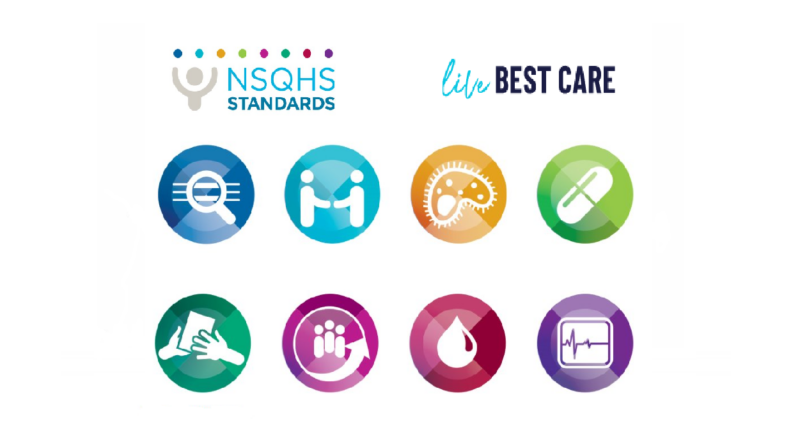
As mentioned In last month’s Nursing & Midwifery News we are focusing on ensuring consistency of practice across our wards, areas, and departments to ensure we are all delivering Best Care safely and reliably.
The Managers Accreditation Checklist has been a useful tool in the past and has been reinvented with checklist items under the relevant NSQHS Standard; the Checklist is helpful in achieving the consistency in service delivery and best care that our consumers can expect across the organisation.
The Manager Accreditation Checklist has been incorporated in a Managers Accreditation Manual which contains the Checklist and Embrace your Space Tips.
The checklist contains items that require action to ensure the area and staff are prepared for NSQHS Accreditation; not all items on the checklist will be relevant to particular areas. Within the checklist some items may contain a hyperlink to an Embrace Your Space Tip.
The Embrace Your Space Tips are key messages for frontline staff with a practical solution for managers, assistant managers, and portfolio holders. The Embrace Your Space Tip provides practical information to action an item on the checklist.
Managers are responsible for completing the checklist and delegating items on the checklist as appropriate. The checklist should be completed monthly; managers are expected to re-visit the checklist for completion as needed and within 24 hours of receiving notice of NSQHS Accreditation.
This resource tool will be useful to remain prepared for short notice NSQHS Accreditation into the future.
Changes to Basic Life Support training
It is with great excitement that the Resuscitation team can confirm the large organisational change to Basic Life Support (BLS) Mandatory Training has occurred and it is now time to complete your mandatory competencies.
Moving forward, when staff complete their BLS mandatory training they will be asked to choose their pathway as shown below:

Summary of pathway:
- Senior medical staff are required to complete:
- online BLS Mandatory Training Quiz and recertify every 2 years
- Staff completing BLS for the first time at Western Health are required to complete:
- mandatory face to face assessment,
- complimented by online eLearning module; and
- a knowledge check quiz,
- both online components are optional but advisable learning
- All other staff that have previously completed BLS at Western Health and require annual mandatory training, should complete:
- BLS online mandatory training quiz,
- optional online eLearning module, and
- practical hands on CPR practice at a local ward level or through simulation training.
If staff are unsuccessful after two quiz attempts, they will be directed to complete a face to face mandatory assessment.
You can locate sessions by clicking on this link: Course: Basic Life Support (BLS)
Emergency Use of Group O Red Blood Cells
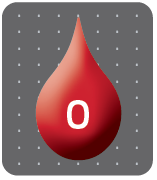
Following the Nation Blood Authority’s recent National Statement for the emergency use of Group O red blood cells, commencing 1st October 2023, Western Health will adhere to the following recommendations for the Emergency use of Group O Uncrossmatched RBC:
- Emergency uncrossmatched group O RBC are to be used only in an emergency to save a patient’s life and when there is no current valid pretransfusion specimen, not as a time-saving measure.
- Where a patient’s ABO RhD blood group is unknown or has not been confirmed by current pretransfusion testing then the following applies:
- For females of childbearing potential (≤ 50 years) and paediatric males ≤ 18 years
- issue group O RhD negative uncrossmatched RBC until the patient’s ABO RhD blood group has been determined using a valid current specimen.
- For females > 50 years and all adult males > 18 years
- issue group O RhD positive uncrossmatched RBC until the patient’s ABO RhD blood group has been determined using a valid current specimen.
- For females of childbearing potential (≤ 50 years) and paediatric males ≤ 18 years
For continuity, medical staff have been asked to order “Emergency group O RBCs” and ensure their contact details are on the request form. Issue of the most appropriate group O red blood cells will be determined by the blood bank pathologist, with the stock at hand in mind.
Please let your teams know that they may receive group O RhD positive RBCs in emergency cases. And as always – should always call blood bank to confirm any ABO inconsistencies between the recipient and the donor.
If you have any questions or concerns, please contact Helen Tran – Blood Management CNC.
Benchmarking Best Care
The latest benchmark reports from the Health Roundtable that go up to March 2023 show how our delivery of Best Care compares to other health services across Australasia.
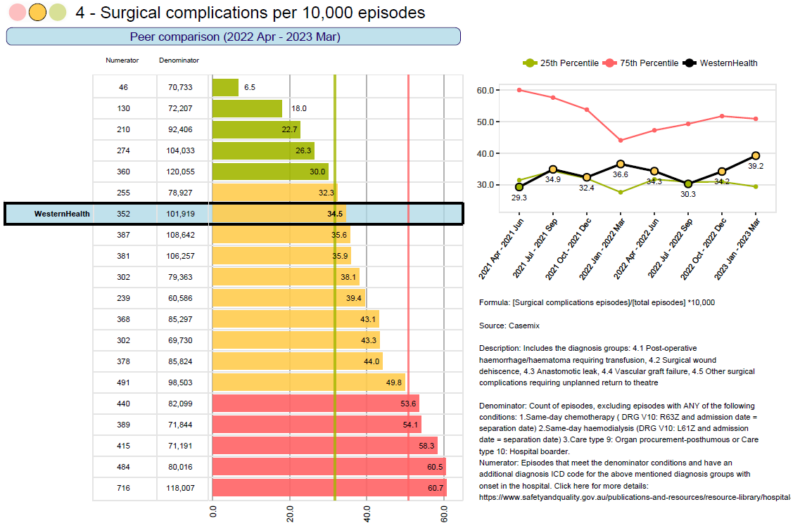
Let’s look at how we perform in the area of Surgical Complications, which includes post-operative haemorrhage or haematoma requiring transfusion, surgical wound dehiscence, anastomotic leak, vascular graft failure or any other surgical complication requiring a return to theatre.
Surgical Complications
For surgical complications Western Health has been fairly consistently in the low amber when compared to our peers, and this has remained pretty stable.
There has been a slight rise in the last quarter, which is something that we will monitor.
Well done to all of our nurses that have a continuing focus on keeping post-operative complications low for our patients.
ORCID and ResearchGate help for our researchers

The Library is now offering 1-on-1 support with creating ORCID and ResearchGate profiles to help promote WH research staff’s publications.
An ORCID is a free persistent digital identifier that distinguishes you from every other researcher. PubMed, Medline and Embase index author ORCID ID’s.
ResearchGate is a free professional networking site for researchers and the scientific community. Researchers can create a profile and share research outputs and publications, as well as follow colleagues or organisations, and view job boards. It allows you to increase visibility of your research globally.
Adding your research is not limited to journal articles, you can also link datasets and conference poster abstracts to further promote your research endeavours.
To find out more information, and to get hands on help with creating a profile for either ORCID or ResearchGate (or both, time permitting). contact Reachana.
For 1-on-1 support, secure your spot now:
October bookings (click here).
Educational Opportunities
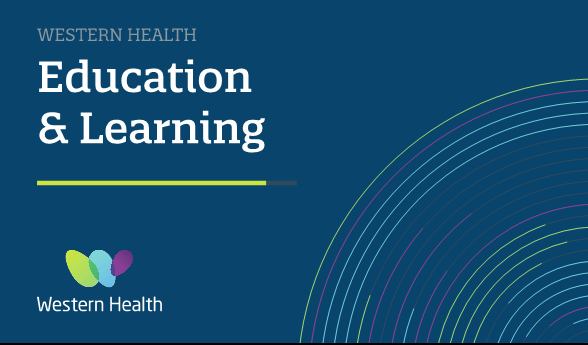
Fisher and Paykel Respiratory Support training:
RSVP to: education.australia@fphcare.com.au
- Adult & Paediatric Respiratory Support: Wednesday 4 October 2023 – WCHRE Lecture Theatre: 9.00am to 1.00pm
Education and Learning upcoming events:
- 11/10/2023: Renal Study Day
- 17/10/2023: Night Duty: Deteriorating Patient
- 27/10/2023: Mental Health First Aid
- 01/11/2023: Stroke Study Day
- 02/11/2023: Deteriorating Patient Study Day
- 02/11/2023: Respiratory Study Day
- 15/11/2023: Heart Failure Study Day
- 21/11/2023: Nutrition Study Day
- 23/11/2023: ALS2 Training
More courses click here: Courses and Inservices (westernhealth.org.au)
Course Enrolment/Inquiries:
- WeLearn Helpdesk Email: welearn@wh.org.au
- WeLearn Enrolment link: welearn@wh.org.au
Emerging Evidence
The Western Health Library Service is a great source for locating the latest nursing and midwifery related evidence-based practice and research.
Latest articles of interest:
- Advocacy, accountability and autonomy: the learning intention of the midwifery student continuity of care experience. Nurse Education in Practice. 2023: August. Full Text Western Health Author
- The association between shift scheduling and burnout, insomnia, and well-being in critical care nurses. Australian Critical Care. 2023: Supplement 1. Request Article Western Health Author
- Building critical care nursing research capacity. Intensive & Critical Care Nursing. 2023: August. Request Article Western Health Author
- The changing landscape of obesity in pregnant women in Victoria. Women & Birth. 2023: Supplement 1. Full Text Western Health Author
- Changing the intention: embracing the Continuity of Care Experience educational model for students. Women & Birth. 2023: Supplement 1. Full Text Western Health Author
- Evaluation of the EVE app for maternity care at Western Health. Women & Birth. 2023: Supplement 1. Full Text Western Health Author
- Exploring the educational needs of non-specialist cancer nurses who provide care for people with cancer: a mixed-methods study. Australian Journal of Cancer Nursing. 2023: August. Full Text Western Health Author
- A gym-based exercise program for patients with breast cancer: a mixed methods evaluation. Australian Journal of Cancer. 2023: August. Full Text Western Health Author
- Health-care related barriers and enablers for weight management among pregnant women with overweight and obesity: a rapid review. Women & Birth. 2023: Supplement 1. Full Text Western Health Author
- Improving assessment and escalation of threatened haemodialysis access: results of a nursing-led program. BMC Nephrology. 2023: September. Full Text Western Health AuthorMoral distress in midwifery practice: a Delphi study. Women & Birth. 2023: September. Full Text Western Health Author
New Nursing/Midwifery eBooks
- Qualitative research methods for nurses. Sage, 2021. (Sage eBook Guide)
This book provides an overview of qualitative methods nurses need to understand when considering their research project. It covers the entire research process, specifically relating to qualitative methods, and the authors have drawn on their years of experience to provide an overview of how the field has developed, along with some practical tools and advice for approaching a research project. It uses multiple real-world case studies to highlight qualitative research in a work-based context.
View all recently added print and eBook catalogue titles
Accessing the Library at Work:
All eligible staff can access electronic library resources from any networked PC or device connected to Wi-Fi network without the need to login.
Accessing the Library Remotely (offsite access):
- When accessing electronic resources through the library website from offsite you will automatically be asked to enter your library membership number and surname.
- Library Membership is free and can be completed online. Please email the library if you experience issues when registering (e.g. error messages).
For more information please contact the Western Health library team.

